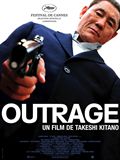
|
Outrage review
:. Director: Takeshi Kitano
:. Starring: Takeshi Kitano, Jun Kunimura
:. Running Time: 1:49
:. Year: 2010
:. Country: Japan
|
A yakuza film without severed fingers, revolting loudness, or explosions of violence is not a yakuza film. Luckily, Takeshi Kitano's Outrage contains all these elements and more. It's simple, for almost two hours, the film shows scenes, one after the other, of torture, of humiliations and of massacres, in a fast-paced and uncompromising manner, and the only breaths come from a few scenes where the killers meet to organize their next settling of accounts. Extremely overdone but deliciously exhilarating.
In their struggle for power and territory, several mafia clans clash with great bursts of guns, blades and fists. Breaking the precarious balance that different alliances had created and set up by a hierarchical clan, this war destroys a whole system from within. Outrage rhyming with spring-cleaning, we are witnessing a bloody purge, and not without a certain pleasure, like that of seeing the creativity of certain death sentences, as the horizontal hanging: installed on the passenger seat of a car, a rope around his neck, bound and tied to a beam on the sidewalk, a henchman's head is almost pulled of once the vehicle starts accelerating. Another example? A clan boss is ordered to stick out his tongue before receiving a blow to the jaw, severing it; a Mafioso trapped during a visit to the dentist, gets his mouth drilled savagely; an interrogation is helped along with large quantities of chopsticks stuck into the ears and of hands cut through a grinder ... We could make a comprehensive list of bloodshed but it would be telling the whole film. For his return to the yakuza film since Brother, Kitano strikes hard and fast: he removes all poetry from his shots, preferring the pace and brutality of the scenes of violence.
However, the film, which leaves no respite to the viewer and does not spare any of the characters, treating all of them on the same footing (all of them bloodthirsty brutes, greedy and power hungry), takes on the appearance of a cartoon flirting at times with caricature, and causing a certain degree of orgasmic hilarity. Although weaker in the plot category, involving the ambassador of a small African country forced to sell warehouses to build a casino, the film shows a certain endurance and even seems to suggest a rise in power in the great slaughter that it is counting. Every murder precipitates further the fall of all the protagonists, drawn into a destructive vortex from which none, or almost none, come out unscathed. Too bad that the bias of the director of Hana-Bi, Violent Cop, or of Sonatine leaves no place for frivolity, preferring the crudity of violence to the poetic subtleties of his previous films.
Moland Fengkov
Translated into English by Christina Azarnia

 Movie Reviews: American Films Movie Reviews: American Films
 Brother Brother
 Zatoichi Zatoichi
 Movie Reviews: Japanese Films Movie Reviews: Japanese Films
 Reviews 2012 - present Reviews 2012 - present
 Reviews 1998 - 2012 Reviews 1998 - 2012
|
|


